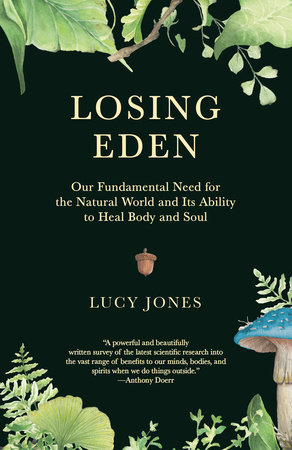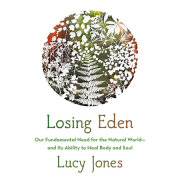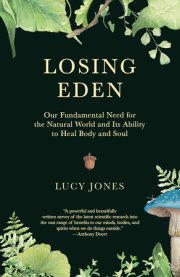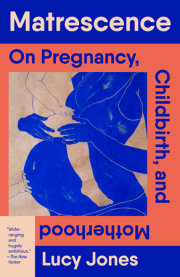Introduction: The Baby in the Soil One late-summer afternoon, I was sitting at the edge of a wildflower bed in my garden with my baby daughter, touching desiccated seed heads and looking for worms in the soil. Spiders the colour of syrup had sprung up in webs across the garden, their coracle rumps jewel-like in the sun. Although it was August, it already felt like autumn in southern England. The apples and plums were falling, the ground was jam-slicked and wasp-studded, and the leaves were turning. As I pointed out where the hedgehog came out for beetles and caterpillars at night, I looked at my daughter, and felt a chill.
The papers were full of droughts, floods, extreme weather events and high temperatures, sometimes even beyond what scientists had predicted. What was coming for her and her generation? Climate chaos was accelerating. Ice was melting faster than expected. The world seemed to be on fire. Closer to home, the seasons felt off—autumn in August, midwinter in March. Every day brought news of another species in fast decline. Swifts, swallows, hedgehogs, all were on the road to extinction. Would there be any ancient woodlands left or old oaks to climb and wonder at? How many more species of bird would join the Spix’s macaw, the poo-uli, the Pernambuco pygmy-owl and the cryptic tree-hunter and die out this century? With 80 percent of Europe and the United States already without their dark skies because of light pollution, would she ever see the Milky Way? And what would this “biological annihilation,” as scientists had put it, do to her mind and spirit, assuming she managed to survive at all?
Around that time, I read about a depressing concept, coined by the American author, ecologist and lepidopterist Robert Pyle: the “extinction of experience.” As fewer children connect with nature, it will follow, he argues, that if they become parents, their children will in turn have an even more tenuous connection with the natural world. “Its premise involves a cycle of disaffection and loss that begins with the extinction of hitherto common species, events, and flavours in our own immediate surrounds; this loss leads to ignorance of variety and nuance, thence to alienation, apathy, an absence of caring, and ultimately to further extinction.”
I could see this pattern in my own family. My grandmothers had an inherent lexicon of the natural world and how it operates. My parents knew their birds, flowers and plants; names, timing and behaviours. I knew a bit, maybe 5 to 10 percent of what they knew, and I was keener on wildlife than most of my friends. It would follow that my daughter’s connection with the natural world would be even more remote than mine. Would she be able to name—by which I mean know—anything at all? Or would she be so desensitized to the point where a connection with nature would have little, or no, value? As Pyle wrote, “What is the extinction of the condor to a child who’s never known a wren?”
We have never been at this point of disconnection with the rest of nature before. In Britain, half of our ancient woodland has disappeared in the last eighty years. During the twentieth century, 97 percent of lowland meadows and 90 percent of coppiced woodland in England and Wales was lost, along with the animal and plant communities that lived in them. More than one in ten species are now under threat of extinction in the United Kingdom. Over just the last fifty years the populations of mammals, birds, reptiles and fish have fallen by 60 percent worldwide.
Our behaviour has changed as the landscape has winnowed. Simply put, we’ve moved inside. We live in cubicles, cars and tower blocks, spending only 1 to 5 percent of our time outdoors. We’re used to surviving outside the rhythms of the natural world. Our need, opportunities and desire to interact with the rest of nature have dramatically decreased.
In 2005, the influential American writer Richard Louv coined the phrase “nature-deficit disorder” to refer to the impact of a lack of connection with nature on people’s health. “It describes the human costs of alienation from nature, among them: diminished use of the senses, attention difficulties, and higher rates of physical and emotional illnesses,” he wrote. Since then, the disconnection is starting to make its way into our language. In the same decade, the Australian philosopher Glenn Albrecht, frustrated that there were few concepts in the English language to help make sense of the relationship between humans, the built environment, the natural environment and our psychological states, coined the word “psychoterratic,” which describes both earth-( terra) and mental health (psyche)–related emotions, feelings and conditions. Psychoterratic illnesses, for example, are earth-related mental health issues such as ecoanxiety and global dread. “Solastalgia”—an admixture of solace, nostalgia and destruction—describes a feeling of nostalgia and powerlessness about a place that once brought solace which has been destroyed. Another new term is “species loneliness,” to mean a collective sorrow and anxiety arising from our disconnection from other species. The environmental writer Robin Wall Kimmerer describes it as “a deep, unnamed sadness stemming from estrangement from the rest of Creation, from the loss of relationship.”
And yet, judging by the way we treat forests and fens, the seas and the rivers, and the wildlife that live in them, it would appear that industrialized society perceives nature to be little more than a nicety: a luxury, an extra, a garnish—“ Green crap,” as the former prime minister David Cameron reportedly called environmental policies—rather than the support system that keeps us all alive.
Certainly my daughter and her generation were born into a time of extraordinary disconnection, rapid climate destruction and psychological retreat from the rest of the living world. And yet, they are also connected to nature through story and language that stretch back into the deep past.
Humans have long turned to aspects of the natural world—particularly animals, landscapes, weather patterns and biological processes—as a way to interpret and make sense of our existence. From simple, practical idioms—“ out on a limb,” “the early bird catches the worm,” “down to earth”—to vast cosmic symbols of renewal, regeneration and tenacity, nature imagery helps us to understand and extract meaning from the world we find ourselves in. Of course our earliest creation myths and cosmologies are filled with shared motifs from the natural world—floods, serpents, eggs and animistic beliefs—as early humans were much closer to nature. But, despite our disconnection, we still turn to it today. We even reach for it when we think about the internet: “web,” “stream,” “raw data.” We are deeply entwined with the rest of nature on a linguistic and mental level; we have created our language, culture and consciousness—the most essential parts of human psychology, from which our desires and preferences flow—within, and in close relationship to, the natural environment we have lived in for millennia. The writer and naturalist Richard Mabey puts this well: “Our imaginative affinities with the natural world are a crucial
ecological bond, as essential to us as our material needs for air and water and photosynthesising plants.”
Our aesthetic preference for nature’s flora and fauna can be traced through human history to the modern day. Ancient urban communities in Byzantium, Persia and medieval China were designed with ornamental gardens; Pompeii was decorated with frescos of natural scenes; Cistercian monks grew flowers and planted trees for the sake of their beauty from the twelfth century. We have also brought the natural world inside with us, from the paintings of animals on the walls of caves and woodblock prints of flowers, mountains, storms and waves in China and Japan, to the European tradition of bringing an evergreen tree into the house each winter. These days, the most popular PC or laptop wallpapers are images of cherry blossom, autumn leaves and turquoise seas; millennials, in particular, bring potted plants into their flats and houses in increasing numbers, and in 2017, Pantone’s colour of the year was Spring Green. (The company decides on the colour of the year by reading the “mood and attitude” of the global culture. Green was chosen because it “symbolizes the reconnection we seek with nature.”)
So why exactly are we drawn to these elements?
Copyright © 2021 by Lucy Jones. All rights reserved. No part of this excerpt may be reproduced or reprinted without permission in writing from the publisher.







